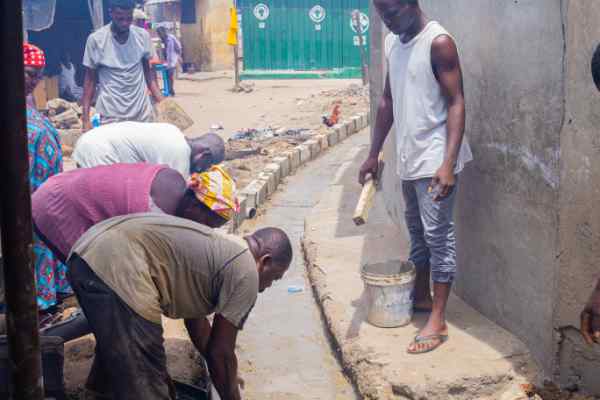Images of climate innovation
Uniting against a common invisible enemy
The image shows community volunteers engaged in the construction of a drain as part of our novel solution to the interlinked problem of poor sanitation, flooding and unsafe water in low-income urban settlements in Africa. Flooding is a major conduit for water contamination from poorly contained sewage. The RECIRCULATE project works with communities in Ghana to provide a safe circular solution to this problem with a co-benefit of producing clean energy and fertiliser.

The Lancaster University-led RECIRCULATE project aims at driving eco-innovation in Africa by building capacity for a safe circular water economy with partners in Ghana, Nigeria and other African countries.
Its water for sanitation and health work package (WP2) is deploying novel solutions to the interlinked problem of poor sanitation, flooding and unsafe drinking water in Africa's urban informal communities. Flooding is a major conduit for water contamination from poorly contained faecal matter. Our research involved operationalising a stakeholder collective to implement assisted management of faecal waste from informal toilets in two low-income communities in Accra, Ghana one control and the other receiving both technical interventions and behavioural changes. The faecal matter was collected and subjected to off-site anaerobic digestion.
The bioenergy (methane gas) generated was measured and the output digestant (potential fertiliser) was applied to cabbage plots and any enhanced growth was measured against controls. Community-led maintenance of existing drains and construction of new ones contributed to resilience against flooding. We installed a weather station in the community to measure the amount of rainfall as part of an educational approach to highlight the effect of community action against factors such as rainfall. A suite of behavioural change initiatives complemented faecal waste removal and drain maintenance activities in the treatment settlement.
This involved nurturing a group of resident youths into behavioural change agents, alongside forming a community-based organisation (CBO) to mobilise actions on the ground. Our research demonstrates that a conglomeration of local people, NGOs and CBOs, agencies and enterprises can turn the faecal matter from informal urban settlements into usable resources. These diverse stakeholders constitute and benefit from our education pathways that ensure that the challenge and its solution is made visible to ordinary people, and those tasked with water provision.
Entrant: RECIRCULATE WP2 - Water for Sanitation and Health , Lancaster University
Copyright: Bennett Akuffo
Funding: UKRI through the Global Challenges Research Fund (GCRF)
Collaborators: Lancaster University; Council for Scientific and Industrial Research (CSIR) - Institute of Industrial Research & Water Research Institute; Green Advocacy Ghana and Sewerage Systems Ghana Limited.